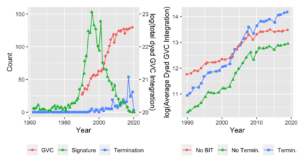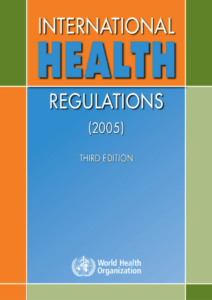Empowered by Information: Disease Outbreak Reporting at the World Health Organization
Information provision by international organizations (IOs) contributes to international cooperation. However, scholars have rarely explored how political alignment moderates the effect of information. I argue that information dissemination by IOs increases cooperation, especially from politically isolated states. I investigate how the World Health Organization (WHO) induces states’ reporting of disease outbreaks. States may conceal disease outbreaks to avoid border restrictions imposed by other states. To prevent disease concealment, the WHO was delegated the unilateral authority to disseminate information by the International Health Regulations reform. This reform allowed the WHO to trigger border restrictions, deterring states’ attempts at disease concealment, especially for isolated states that receive stronger border restrictions. I find that the reform increased the disease outbreak reporting by states isolated from the US and its allies, but not those isolated from China or Russia. This paper reveals the political cleavage of the institutional design of information authority in IOs.
Obsolescent Treaties: Global Value Chains and the Termination of Bilateral Investment Treaties
Global value chain (GVC) integration makes contractual forms of asset protection redundant, leading to the decline of bilateral investment treaties (BITs). As a technological change in trade, GVCs create positive spillovers—such as employment and economic growth—to the host country, which changes the political calculus of expropriation. The host government trades off the benefits of rents from taxation or even expropriation of foreign investment, with the political benefits associated with the increased employment and growth that follow GVCs. As the disaggregated production deepens, the government’s commitment problem to not over-tax these firms weakens. This reduces foreign investors’ need for BITs as insurance for entry. Deeper GVCs are associated with BIT termination, especially where leaders may care more about worker wages, such as in democracies. Using value-added in trade indicators at the dyad level to measure GVC integration, I find that dyads with deeper GVC integration are more likely to experience BITs termination. Meanwhile, when GVC integration is high, democracies are more likely to unilaterally terminate BITs. This paper reveals how globalization transforms itself through technological change.

Firm Influence in the Era of Rising Trade Barriers: Evidence from the US-China Trade War
(Draft)
Despite their domestic distributive consequences among firms, trade barriers are increasingly used to influence other countries’ policies. Given the high stakes in trade barriers, firms have incentives to shape the policy in their favor, but which firms’ interests are represented in the policy? Integrating the redistributive politics of trade policy with a firm-level analysis, this paper argues that firms that are pivotal to policymakers’ electoral prospects will be more influential in the design of trade barriers. I examine firms’ comments on specific product lines on the U.S. tariff lists of Chinese imports during the U.S.-China trade war in 2018, which allows me to evaluate which firms’ comments are more influential in the final tariff lists. I find that firms located in districts whose Republican candidates’ vote share is in the range of 45 to 55% for two consecutive elections are more influential over the tariff lists. This paper highlights the importance of economic geography in firms’ influence in the era of rising trade barriers.

